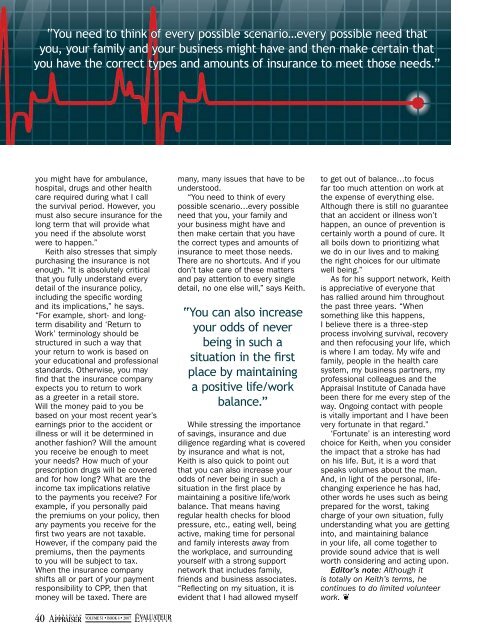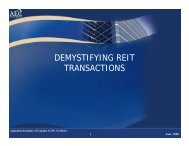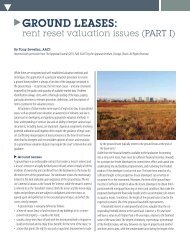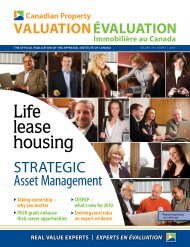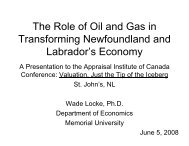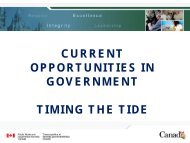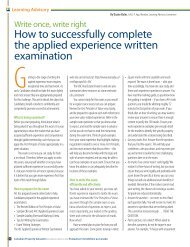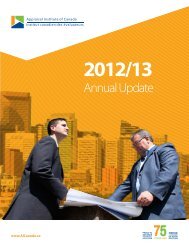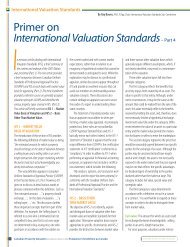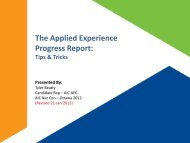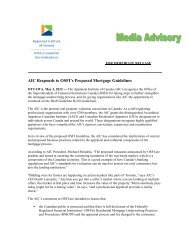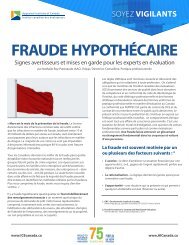Book 4 - Appraisal Institute of Canada
Book 4 - Appraisal Institute of Canada
Book 4 - Appraisal Institute of Canada
You also want an ePaper? Increase the reach of your titles
YUMPU automatically turns print PDFs into web optimized ePapers that Google loves.
“You need to think <strong>of</strong> every possible scenario…every possible need thatyou, your family and your business might have and then make certain thatyou have the correct types and amounts <strong>of</strong> insurance to meet those needs.”you might have for ambulance,hospital, drugs and other healthcare required during what I callthe survival period. However, youmust also secure insurance for thelong term that will provide whatyou need if the absolute worstwere to happen.”Keith also stresses that simplypurchasing the insurance is notenough. “It is absolutely criticalthat you fully understand everydetail <strong>of</strong> the insurance policy,including the specific wordingand its implications,” he says.“For example, short- and longtermdisability and ‘Return toWork’ terminology should bestructured in such a way thatyour return to work is based onyour educational and pr<strong>of</strong>essionalstandards. Otherwise, you mayfind that the insurance companyexpects you to return to workas a greeter in a retail store.Will the money paid to you bebased on your most recent year’searnings prior to the accident orillness or will it be determined inanother fashion? Will the amountyou receive be enough to meetyour needs? How much <strong>of</strong> yourprescription drugs will be coveredand for how long? What are theincome tax implications relativeto the payments you receive? Forexample, if you personally paidthe premiums on your policy, thenany payments you receive for thefirst two years are not taxable.However, if the company paid thepremiums, then the paymentsto you will be subject to tax.When the insurance companyshifts all or part <strong>of</strong> your paymentresponsibility to CPP, then thatmoney will be taxed. There are40C a n a d i a nAppraiserVolume 51 • book 4 • 2007EvaluateurC a n a d i e nmany, many issues that have to beunderstood.“You need to think <strong>of</strong> everypossible scenario…every possibleneed that you, your family andyour business might have andthen make certain that you havethe correct types and amounts <strong>of</strong>insurance to meet those needs.There are no shortcuts. And if youdon’t take care <strong>of</strong> these mattersand pay attention to every singledetail, no one else will,” says Keith.“You can also increaseyour odds <strong>of</strong> neverbeing in such asituation in the firstplace by maintaininga positive life/workbalance.”While stressing the importance<strong>of</strong> savings, insurance and duediligence regarding what is coveredby insurance and what is not,Keith is also quick to point outthat you can also increase yourodds <strong>of</strong> never being in such asituation in the first place bymaintaining a positive life/workbalance. That means havingregular health checks for bloodpressure, etc., eating well, beingactive, making time for personaland family interests away fromthe workplace, and surroundingyourself with a strong supportnetwork that includes family,friends and business associates.“Reflecting on my situation, it isevident that I had allowed myselfto get out <strong>of</strong> balance…to focusfar too much attention on work atthe expense <strong>of</strong> everything else.Although there is still no guaranteethat an accident or illness won’thappen, an ounce <strong>of</strong> prevention iscertainly worth a pound <strong>of</strong> cure. Itall boils down to prioritizing whatwe do in our lives and to makingthe right choices for our ultimatewell being.”As for his support network, Keithis appreciative <strong>of</strong> everyone thathas rallied around him throughoutthe past three years. “Whensomething like this happens,I believe there is a three-stepprocess involving survival, recoveryand then refocusing your life, whichis where I am today. My wife andfamily, people in the health caresystem, my business partners, mypr<strong>of</strong>essional colleagues and the<strong>Appraisal</strong> <strong>Institute</strong> <strong>of</strong> <strong>Canada</strong> havebeen there for me every step <strong>of</strong> theway. Ongoing contact with peopleis vitally important and I have beenvery fortunate in that regard.”‘Fortunate’ is an interesting wordchoice for Keith, when you considerthe impact that a stroke has hadon his life. But, it is a word thatspeaks volumes about the man.And, in light <strong>of</strong> the personal, lifechangingexperience he has had,other words he uses such as beingprepared for the worst, takingcharge <strong>of</strong> your own situation, fullyunderstanding what you are gettinginto, and maintaining balancein your life, all come together toprovide sound advice that is wellworth considering and acting upon.Editor’s note: Although itis totally on Keith’s terms, hecontinues to do limited volunteerwork.


